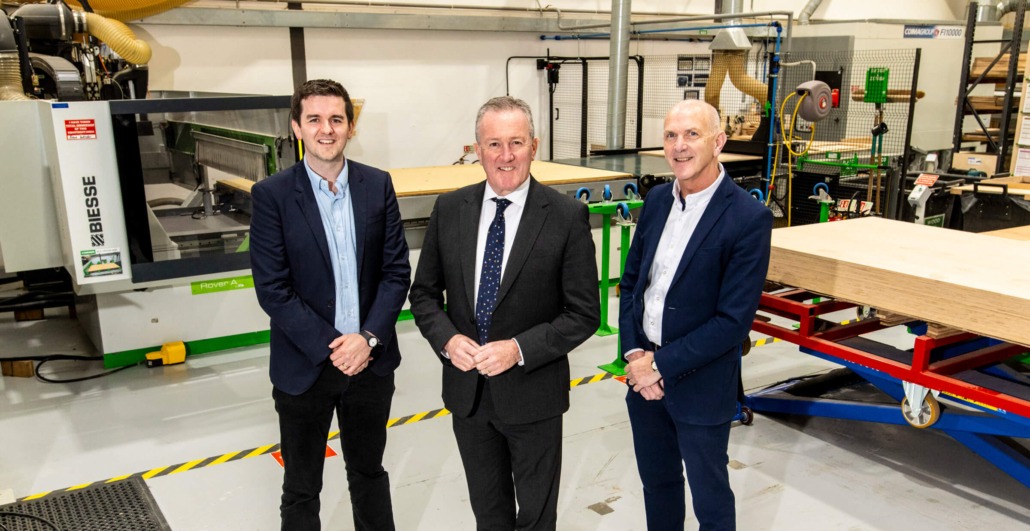Posts
€77m (£65m) of PEACEPLUS funding has been awarded to transform six community facilities and public spaces in Northern Ireland and the border counties of Ireland.
Among the exciting and wide-ranging new cross-community initiatives to receive funding are the conversion of a former military barracks site into a sport, wellbeing and shared learning centre; the creation of a huge ‘Air Dome’ indoor arena in the North-West; and a significant investment at a North Belfast interface to enhance shared space and connectivity between local communities.
Six projects were successful in their bids for investment through PEACEPLUS, a programme managed by the Special EU Programmes Body (SEUPB).
Thousands of people are expected to benefit from the new facilities when completed and it is hoped they will bring people together, promote better understanding and trust, and provide communities with improved services and infrastructure.
The successful projects included within this round of PEACEPLUS funding are:
- The Centre of Participation Wellbeing & Shared Learning Hub (€15.4m) – a 30-acre complex based at the former military barracks site owned by the UK Ministry of Defence in Ballykinlar, Co Down. Led by Down Gaelic Athletic Association in partnership with County Down Rural Community Network and Co-Operation Ireland, the project will see the construction of a new two-storey complex building to include a heritage and shared learning space, and a new 2,000-square-metre multi-purpose games arena (MUGA)
- UU Dome (€10.86m) – Led by Ulster University, this project will transform the old Foyle College site in the city of Derry-Londonderry into a regionally significant and inclusive shared space that will generate significant, meaningful and purposeful contact between different communities. The site, which is currently vacant and disused, will see the development of an ‘Air Dome’ facility comprising of a 15,000 square metre year-round indoor arena with synthetic playing field and capacity for thousands of spectators.
- Reconnected Belfast (€13.5m) – Focused on the Waterworks and Alexandra Park in North Belfast, the project will see further progress towards the removal of peace walls and enhancement of green space for use by local residents, community organisations and schools. Led by Belfast City Council in partnership with the Department of Justice, Reconnected Belfast is part of a strategic connectivity project which aims to make Belfast a fully sustainably connected city via a series of greenways, urban greenways, and pocket parks.
- The Riverine 2023 (€16.7m) shared space – spanning both Lifford in Co Donegal and Strabane in Co Tyrone, the project will include the creation of 30 acres of parklands and a new community pavilion building, developed through a cross-border partnership between Donegal County Council and Derry City and Strabane District Council.
- The Ballycastle Shared Space Project (€5.2m), which will see the enhancement of sports facilities on the grounds of the planned Shared Education Campus (SEC) in the town, providing community access and shared usage between the school and the local community for sport, leisure and recreation purposes. The project will be led by Causeway Coast and Glens Borough Council in partnership with the Department for Education.
- The Shannonside Peace Arena (€15.3m) in Carrick-on-Shannon. Led by Leitrim County Council in partnership with Shannonside Regional Recreational Campus, the project will create a new inclusive shared space with a co-designed, sustainable building which facilitate meaningful and purposeful contact between different communities. The development will include a double-height multi-use sports hall and high-performance gym.
All six projects are to be funded under the Special EU Programme Body’s Re-Imaging Communities investment area, which is part of the €1.14bn PEACEPLUS programme.
Communities Minister Gordon Lyons MLA said: “I am delighted that the PEACEPLUS Steering Committee has approved funding for six projects under the Re-Imaging Communities Investment Area of the PEACEPLUS Programme.
“It is my ambition to deliver policies and programmes that will have real and meaningful impact, that are sustainable and that will provide tangible, lasting benefits.
“My department has previously supported 25 capital builds under the Shared Spaces element of the PEACE III and PEACE IV Programmes which were delivered in partnership with the Special European Union Programmes Body. These projects have clearly demonstrated the many positive impacts such investments can have across society. I am therefore pleased that we are able to build on this success by supporting these new shared spaces.
“I want to congratulate each of the projects on their achievement in securing funding for their proposals.”
Minister for Rural and Community Development Heather Humphreys TD said: “We have witnessed the benefits from the development of these shared spaces under the various PEACE programmes, which have brought about real change through the repurposing of lands, the reimaging of existing buildings and spaces, creating new parks and infrastructure and regenerating peace line interface barriers.
“These shared spaces, which are stunning to look at, have a huge transformational impact and support economic and tourism opportunities in the region, while also ensuring the bringing together of all communities into a safe neutral space and I am sure this programme will be no different.
“I want to commend all the applicants for the time and effort that went into drafting the applications received under this funding call, which was hugely over-subscribed.
“I wish all the success applicants the very best of luck in getting their projects underway for the benefit of all in their communities and surrounding hinterlands. I am delighted that my Department of Rural and Community Development will be partnering with the Department for Communities in Northern Ireland and the Special EU Programmes Body in providing funding for these wonderful projects.”
SEUPB Chief Executive Gina McIntyre said: “There was a huge response to this funding call which really demonstrated the public’s appetite and need for shared spaces within our communities. We have seen from previous PEACE programmes how shared civic spaces can act as beacons of hope within a community, real catalysts for change and enhanced socio-economic environments.
“I am delighted that through PEACEPLUS we will be delivering another six transformed and repurposed facilities for people right across Northern Ireland and the border counties of Ireland.
“These new facilities will provide places where people can come together, collaborate and engage with one another in a safe, inclusive and welcoming environment. They are crucial for peacebuilding and reconciliation.
“Their impact transcends the bricks and mortar required for their construction, penetrating much further into the local community through the changes in both attitudes and behaviours, resulting in a reduction in segregation and contributing to sustained peace and prosperity.”
Unfortunately, given the scale of interest in the investment area, a number of excellent applications were unsuccessful in attaining funding through the Re-Imaging Communities investment area.
The SEUPB said while it recognised this would be disappointing for those impacted, there was a finite budget and those successful must deliver the maximum impact for the community and ensure the provision of the very best services and facilities. This competitive process meant that all applications were rigorously assessed to ensure full compliance with all criteria for public monies.
PEACEPLUS is co-funded by the European Union, the Government of the United Kingdom of Great Britain and Northern Ireland, the Government of Ireland, and the Northern Ireland Executive.
Economy Minister Conor Murphy has launched the Future Medicines Institute (FMI), a £55million industry-led collaborative initiative aimed at advancing the North’s Precision Medicine sector.
Backed by a consortium of leading companies in Precision Medicine and supported by leading academics from Queen’s University Belfast and Ulster University, FMI will drive innovation and productivity in Precision Medicine, building on Northern Ireland’s strong reputation in diagnostics and therapeutics.
Minister Murphy said: “This £55 million investment in the Future Medicines Institute is a landmark step for Precision Medicine in the North which will strengthen our Life and Health Sciences sector and reinforce the region’s role in global healthcare innovation.
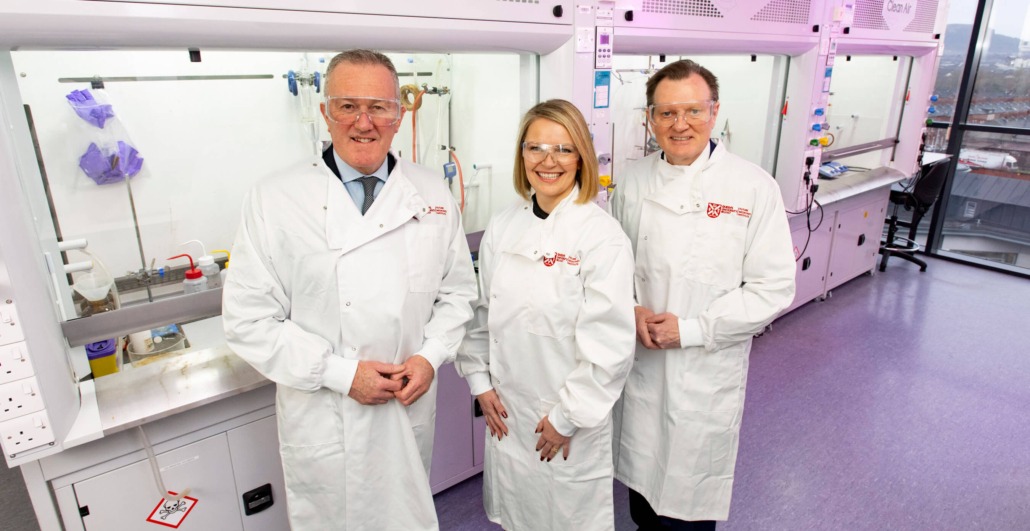
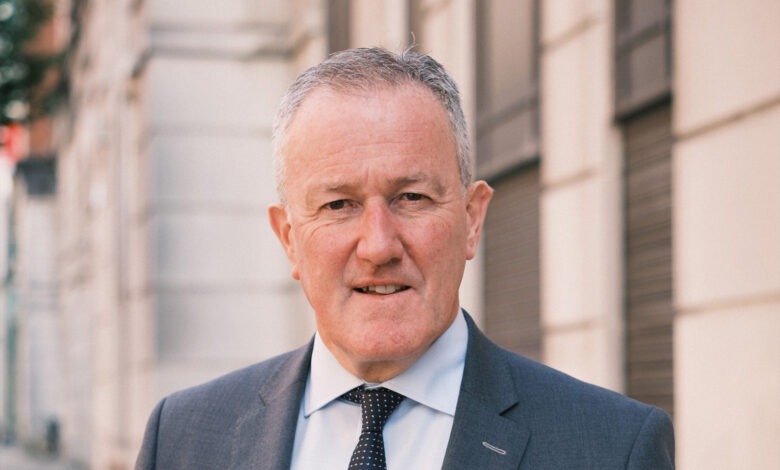
“FMI will foster collaboration across industry, academia, and healthcare to accelerate the development of new drugs and diagnostics, driving growth in our economy. It will provide a vital pathway to speed up patient access to personalised treatments, streamline drug development processes, and bring innovative solutions to market at pace.”
The industry consortium has been offered £35m from the Northern Ireland Executive towards FMI, with the consortium members contributing an additional £20m. This will fund a wide range of collaborative R&D activities between the companies and universities. It will also create a shared lab within Queen’s University Belfast, where industry and academics can come together to collaborate and access leading edge technologies.
Professor Ian Greer, Vice-Chancellor of Queen’s University Belfast, said: “Queen’s is proud to be hosting this initiative, working in partnership with industry experts and Ulster University to advance novel therapeutics and diagnostics. The FMI will stimulate the creation of a cluster for innovation, talent development, and global partnerships within Northern Ireland’s Life and Health Sciences sector.”
The industry consortium is made up of Diaceutics PLC, Fusion Antibodies PLC, Randox Laboratories Ltd, Almac Group, Sonrai Analytics, Exploristics and ProAxsis. Ryan Keeling, CEO of Diaceutics PLC said: “The Future Medicines Institute represents a pivotal step forward for Precision Medicine. At Diaceutics, this collaboration provides an opportunity to harness data-driven insights and cutting-edge technology to improve outcomes across the healthcare sector. By joining forces with other local companies through FMI, we’re reinforcing Northern Ireland’s role as a leader in Precision Medicine.”
The FMI will also focus on skills development, leveraging the local universities and colleges to address talent gaps in the sector, foster spinouts, and drive job creation, supporting the broader Northern Ireland economy.
UK Research & Innovation (UKRI) will manage the delivery of the projects within FMI. Dame Jessica Corner, UKRI SRO for Place and Chair of SIPF, said “We are delighted to welcome the Future Medicines Institute to the Strength in Places Fund programme. Funding from the Northen Ireland Executive for the Institute has enabled a very strong project from the initial competition to join the other UKRI Strength in Places Projects and demonstrates how highly the programme is regarded.
“We look forward to supporting the Future Medicines Institute to benefit very quickly from all the experiences and insights we have gained from the programme and all the other projects to deliver real benefits for the Northern Ireland economy and widely for society.”
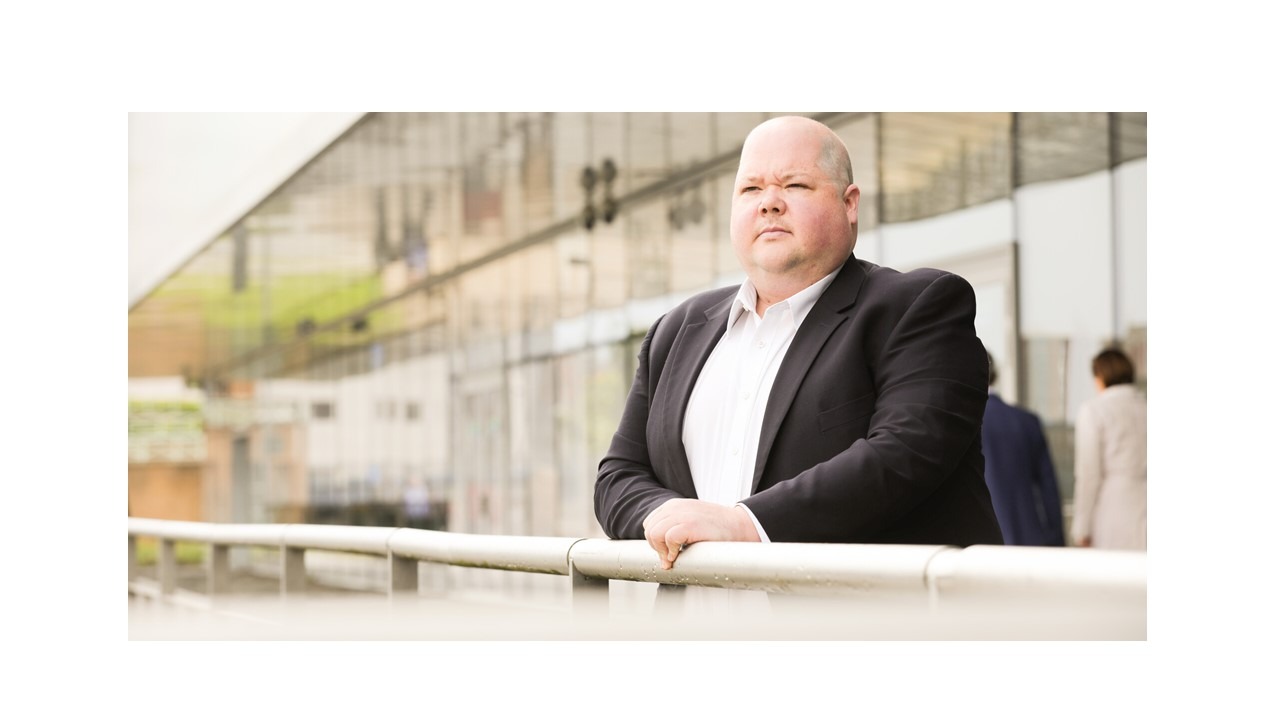
The Derry-Londonderry and Strabane City Region City Deal has celebrated a major milestone with the signing of a Financial Deal to unlock more than £290 million of investment in health, life science and digital projects and bring transformational change to the region.

Derry City and Strabane District Council Chief Executive John Kelpie explains the key benefits of the City Deal, and what it could mean to people hoping to return to the North West.
Congratulations on the signing of the Financial Deal. How will the City Deal change people’s day-to-day lives in the Derry City and Strabane region?
The Derry City and Strabane City Deal will improve people’s quality of life by creating more job opportunities, a safer, more vibrant city and town centre, and a focus on education and skills. It has the potential to bring up to 6,300 jobs by 2033 and lever additional millions in investment over the next decade. We aim to increase our output growth with a GVA (gross value added) of £230m per annum, which should see a significant rise in wages. People can expect to see real growth in sectors such as health and life sciences, digital industries and SMART technology that will support economic investment and regeneration, and also boost tourism and culture.
As someone who has been working on the City Deal since its inception, what aspect of the deal are you most proud of?
This is a once in a generation deal; its impact will be felt by the people of the city and district for many years to come. Personally, I’m proud of the collaboration between all the key partners who worked tirelessly to get it across the line. It’s been a joined-up approach which has seen us harness collective resources, expertise and passion for the North West. The investment from the UK government and NI Executive, plus the input from all the delivery partners, allows us to leverage additional private sector investment and make a real, positive difference to local people’s lives.
What type of jobs will be created?
We anticipate jobs will be created across all City Deal projects – including Smart Cities and digital enabling infrastructure, the School of Medicine and C-TRIC expansion, Strabane town centre’s regeneration, the Derry riverfront regeneration, Walled City tourism and the DNA (Derry North Atlantic) Museum in Ebrington.
Sustainability, inclusivity and employability are crucial and partners are already working to create a skills pipeline for the employment opportunities created by the City Deal – helping people upskill, reskill and boost digital skills.
The investment will also boost confidence and stimulate additional private sector activity and jobs. We anticipate an overall increase of 12% in the labour market, with large increases in areas such as healthcare and tourism.
What benefits will the City Deal bring for potential investors?
The North West is already an attractive proposition for investors, thanks to our unique cross-border location, our talented, well-educated workforce, and our fantastic quality of life. The City Deal, with its emphasis on innovation, digital infrastructure and regeneration will transform our local economy, and make the city and district an even greater place to do business.
What are the next steps for the City Deal?
The official signing of the Financial Deal means Council and its delivery partners can now access funding to progress to the next stage of delivering the projects, once the full business cases are approved. The next phase of the City Deal will focus on detailed design and delivery. This work will include a wider awareness and engagement process, as the designs are developed.
What message would you have for anyone looking to return or relocate to the North West?
If you grew up here, or are considering a move here, you’ll already know that there’s nowhere quite like the North West. Our location, the friendliness of our people and our rich cultural heritage are second to none. There’s an energy and excitement here, and economic growth in recent years means we are already seeing diaspora return to live, work and raise their families. The City Deal will supercharge that prosperity, innovation and regeneration. There’s never been a better time to come home. I would encourage anyone considering relocation to visit investderrystrabane.com and sign up to the Derry Strabane Global newsletter for job and investment updates, and help planning their move.
When will City Deal projects be visible on the ground?
The pledge by the UK and NI Governments with the signing of the Financial Deal allows us to progress to the delivery phase of the projects, which will be on a phased approach over the next 10 years. The first visible project will be the DNA Museum being on site by early 2025 and the Museum opening in late 2026. All of the projects are at different stages of delivery, and these will be implemented in phases. With the financial deal in place, we will now be moving at pace to bring the other projects such as the Strabane Strategic Leisure project, a key element of the Strabane Regeneration, to the next stage of delivery. There will also be a focus on creating designs and drawings ahead of engagement with the public and partners.
What legacy do you hope the City Deal will leave for future generations?
With its focus on sustainable growth and lasting change, the positive impacts of the City Deal will be felt for generations to come – from health and wellbeing, to job prospects and economic prosperity. It’s about fulfilling Derry City and Strabane’s potential as a thriving, prosperous and inclusive region for all its inhabitants.
Where can the public find out more and be kept informed about progress?
People can visit www.derrystrabane.com/citydeal and keep an eye on Derry City and Strabane District Council’s social media channel for updates.
Invest Northern Ireland and the Department for the Economy have announced a £16.3 million investment in a new state of the art Artificial Intelligence Collaboration Centre (AICC), to be based at Ulster University in partnership with Queen’s University Belfast.
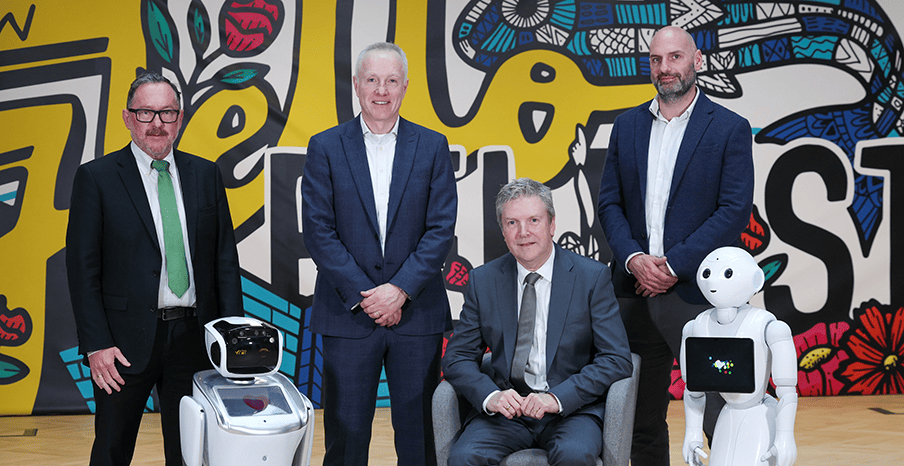
The Centre will focus on increasing business awareness and adoption of Artificial Intelligence (AI) technology to boost competitiveness and productivity across all industries including logistics, finance, life-sciences, manufacturing and Agri-Tech.
The AICC was formally launched at an event on Ulster University’s Belfast campus today. As well as speakers from both Universities and Invest Northern Ireland, attendees heard reflections from Brian Hills, Chief Executive of The Data Lab, on their journey to setting up a similar AI centre in Scotland. There was also a panel discussion on the opportunities and challenges for AI adoption in Northern Ireland with contributions from Kainos, FinTrU, Analytics Engines, Whitespace and both Universities.
“We are in the midst of an AI driven revolution and through this investment we will harness the transformative power of AI, ensuring its potential is diffused and applied to a broad business base which will encourage economic growth and be of great benefit to our people and society.
“This collaborative project, with bases in Belfast and Derry, will serve as a hub for innovation, bringing together research expertise and industry professionals to collaborate on cutting-edge projects and solutions.
“The centre, the people who work there and the important work it will deliver will be an important contributor to my wider economic vision as we aim to raise productivity, promote regional balance, reduce carbon emissions and deliver good jobs.
“As part of today’s announcement, the Department has offered almost £2.5 million to support additional AI and Data Science postgraduate qualifications to be delivered by Ulster University and Queen’s University Belfast to expand the capacity of our talent pipeline to meet industry need.”
Economy Minister: Conor Murphy
The AICC, with bases at Ulster University’s Belfast and Derry/Londonderry campuses and Queen’s, will also encourage greater industrial innovation and collaboration with academia to increase both local and FDI investment. The provision of additional training and professional qualifications in AI will also be delivered through both Universities.
“Our support of £13.8 million over the next 5 years is to increase business knowledge and adoption of AI technology. AI is one of the most important technological developments of the modern era and has the potential to deliver important benefits such as R&D excellence, skills development and increased competitiveness. With some 100 local companies already currently using AI technologies in their operations we have an excellent foundation to build upon our capabilities locally.
“As a region we are already recognised as an area of excellence in the realm of Big Data and data analytics. We now have the opportunity to make our mark in the AI arena and to realise the economic benefits that will come from adopting AI right across our business landscape to improve productivity, deliver good jobs, reduce costs and enhance sectoral competitive positioning.”
Dónal Durkan, Executive Director of Strategy and Partnerships at Invest NI,
“As an academic institution we are proud to be leading the way in cutting edge research relating to the application of AI in business settings. The AICC represents a new resource of 25 dedicated staff who will use their existing knowledge and expertise to inform, educate and empower businesses to adopt AI, as well as stimulating new research and innovation for the responsible adoption of AI.
“In partnership with Queen’s University Belfast we will deliver 390 funded Postgraduate AI qualifications and also classroom-based or online skills training to thousands of workers across Northern Ireland over the next five years.
“The AICC looks forward to working in conjunction with industry to increase adoption of AI while simultaneously creating the AI workforce of the future through the development of new qualifications.”
Professor Brian Meenan, the Ulster University AICC Principal Investigator,
“AI and machine learning are evolving at an amazing rate and major developments are occurring at a monthly level. It offers enormous potential to transform business operations, so university-industry interaction is vital to ensure effective and fruitful engagement. Queen’s academics can provide insights into productivity improvements and help create innovative solutions for challenging problems using state-of-the-art AI approaches.”
Professor Roger Woods, the Queen’s University Principal Investigator
A Unique cross-border location.
There’s no place like home. And there’s no location quite like Derry and Strabane, a unique cross-border region offering an ideal combination of city, coast and countryside.
Whether you’re returning home, or relocating here for the first time, a move to the North West can bring rewarding work opportunities and a life rich in culture, community and breathtaking scenery. The investment proposition here is equally as enticing, with the UK, Ireland and EU markets on your doorstep, and robust local and national support.
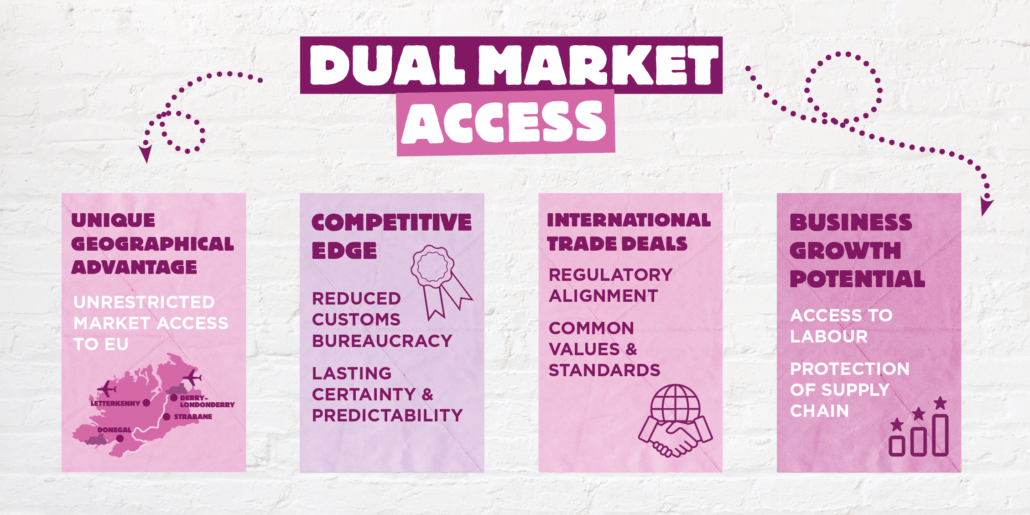
A cross-border hub
As the only cross-border city on the island, Derry has access to multiple markets, a highly skilled young workforce which is culturally literate in operating across two jurisdictions, and investment support available on both sides of the border.
Whether you’re relocating to the North West to grow your business here, work remotely, or join one of our leading local employers, you’ll find excellent superfast broadband availability across the region. We enjoy a 67-millisecond connection with the East Coast of the USA – among the fastest in Europe. As well as 97% superfast broadband coverage to facilitate remote working.
Work opportunities
You might be returning from university seeking a fulfilling graduate role. Maybe you’ve racked up years of experience, and are ready to take the next step in your corporate journey. Or perhaps you want to move back to the North West with your family, to enjoy our fantastic quality of life without compromising on career goals.
Whatever stage you’re at in your career, you’ll find job opportunities in a wide range of sectors here in Derry and Strabane – from award-winning local financial services and engineering firms, to innovative tech and life sciences companies, and major multinational brands.
Support for investors
If you’re looking to grow your business in the North West, Derry City and Strabane District Council can offer investment support, trade missions and connections with the City of London Corporation and international partners to assist and promote your venture.
Organisations such as Intertrade Ireland can help your business explore cross-border markets, while on a national level, Invest NI and IDA Ireland are also there to assist your venture.
The right balance
Quality of life here in the North West is one of the things we value most. It’s why a Sunday Times survey named “cool, credible and cheap” Derry as the best place to live in Northern Ireland.
Derry is a vibrant city – the fourth largest in Ireland – with a young population, a great primary, secondary and third level education system, and famously friendly people (we were ranked number one for community spirit in an NI poll). And of course, our award-winning restaurants and bars are ‘LegenDerry’.
A gateway for exploring
Derry and Strabane are also brilliantly located for enjoying the best the North West has to offer on both sides of the border, nestled where the Wild Atlantic Way meets the Causeway Coastal Route.
Fancy a sunset stroll after work, or a weekend adventure? You can reach a stunning Donegal beach within 20 minutes’ drive of Derry, and even head up to the North Coast for a surf. Or, in less than half an hour’s drive from Strabane town centre, you can be hiking through the breathtaking Sperrin Mountains.
Aoife Warren is a Partner with the global professional services firm EY. As part of EY Northern Ireland’s team, Aoife works with clients across Ireland, the UK, and globally. She is also involved in EY’s plans to establish a new North West hub, and create 1,000 new jobs across Northern Ireland in the next five years. Donegal-born Aoife graduated from Queens University Belfast with a Masters in Computer-Based Learning and lived and worked in the city for around 20 years before relocating to Derry with her family in 2021.

What can you tell us about the new EY hub in the North West?
It is really exciting that as part of our growth aspirations, we will seek to establish a regional hub in the North West to access the breadth of talent in the area.
I’m delighted to be working with Rob Heron, EY NI Managing Partner, on developing the strategy to grow our business in this region.
While EY has its roots in audit, tax, corporate finance and consulting services, over recent years it has expanded rapidly in response to growing client demand to include new offerings in areas such as technology and people advisory services, strategy, Artificial Intelligence and data analytics, among others.
It is our intention to ensure some of these new roles are based in the North West and accessible to all talent in NI.
Why was the North West chosen?
This area was chosen for growth and development as a result of the untapped talent and highly skilled workforce. We are excited to leverage the diverse skillsets here as well as support new skills development through the Assured Skills Academy Programme run by the Department for the Economy.
We also recognise the broader collective focus between government, local councils and higher education, working together to continue to grow the North West region as a place to work and live.
The recent developments in infrastructure, connectivity, and education are attractive to a global firm like EY, establishing itself in the region.
What type of roles will EY be hiring for over the next five years?
As EY expands and develops its operations in Northern Ireland, we see growth opportunities in areas such as technology, data and analytics, people and advisory and risk as well as supporting the development of our core corporate financial and consulting services.
Globally, EY operates a hybrid working model, a model we will also adopt in the North West. We are currently looking at office space to support our ambition to establish our hub as soon as possible.
What does your role involve?
I am a Consulting Partner in EY Northern Ireland, and I work with teams and clients across Ireland, the UK and globally.
I support clients who are preparing for a significant business transaction, this involves helping companies establish or improve business processes.
I am also People Lead for our Northern Ireland operation, which involves continuously reviewing how we are attracting, developing and retaining the best people for our business.
What is an average day at work like for you?
We operate a hybrid working model, so when I’m working from home – early morning is generally spent getting my six and seven-year olds ready for school!
If I am not working from home, I will generally leave early to beat the traffic and get to Belfast by 8am. Once or twice per month I will fly to London directly from Derry Airport for client meetings. The days are spent in a mix of internal strategy and operations meetings, and client facing or business development meetings. And sometimes managing to grab a coffee or lunch with someone during the day.
What I love about my role is that I have the opportunity to work on big, complex and often global, transactions but yet still live in Derry/Londonderry close to my family and friends. I feel very privileged to be able to get the best of both worlds.
Why did you decide to return to the North West?
We loved living in Belfast but my husband is a proud Derry man and I’m from Donegal, so our decision to move ‘home’ was very much driven by wanting to be nearer to family. There are a multitude of other factors including the friendly people, the close-knit community, housing, and lifestyle. We just love this part of the world – the great outdoors, parks, and the beautiful beaches of Donegal. We can finish work and go to the beach with the kids in the evening – when we get the weather!
How do you spend your time off?
I like to meet up with my friends and walk the ‘two bridges’ followed by coffee and breakfast along the quay. As a family we love to explore all the woods, beaches and parks of Derry and Donegal. I love art and dabble a little bit with painting. I try to do weekend workshops with local Derry/Donegal artist Natasha Barr. She runs them from her studio in Quigley’s Point overlooking Lough Foyle – it’s a great way to de-stress and take time-out.
What advice would you have for someone considering a move back to the North West?
I think anyone considering it should weigh up all the factors, do their research and determine when the timing is right for them…but ultimately for us it has been a very positive move.
FinTrU has announced plans to invest over £20m by 2027, which will see the creation of 300 new jobs in Londonderry and a significant investment in the skills of its Northern Ireland wide staff.
Supported by Invest Northern Ireland, the new roles will see FinTrU’s North West operation double in size.
Founded in 2013 by Darragh McCarthy, FinTrU is a multi-award-winning technologically enabled Regulatory Solutions company that works with Global Investment Banks. FinTrU specialises in the areas of KYC, Compliance, Legal, Risk & Controls and Operations. The Financial Times has named FinTrU as one of Europe’s fastest growing companies for two years in succession.
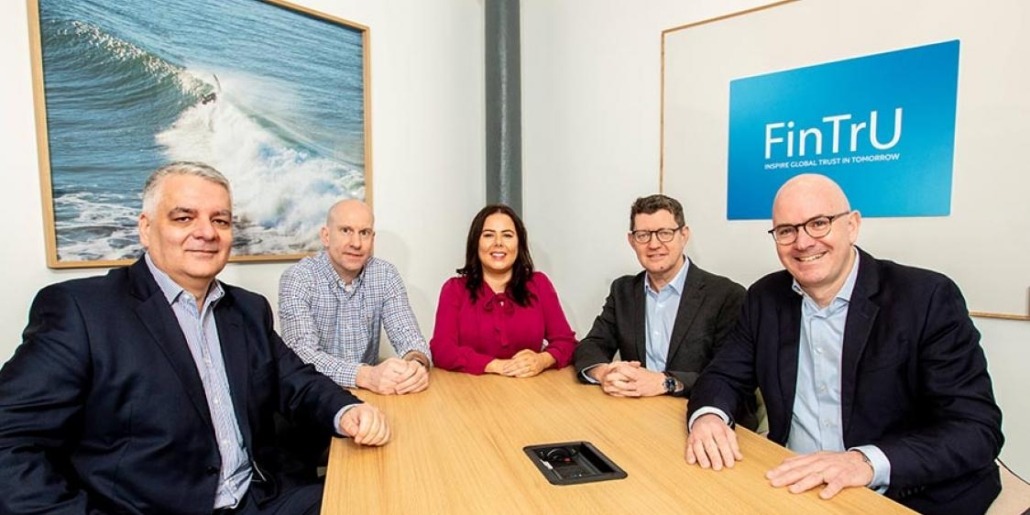
Darragh said the latest expansion is “a significant step which will see FinTrU grow to over 1,500 employees in Northern Ireland and significantly increase our competitiveness, catapulting us into a new era of business growth.
“FinTrU is celebrating its 10th birthday in 2023 and the North West holds a special place in the heart of our business. Since making our first investment in Derry/Londonderry in 2018, we have been blown away by the talent and were able to surpass our initial jobs target one year ahead of schedule. Following the announcement of our Letterkenny site last year, our newest investment is a demonstration of our ongoing commitment to develop and champion the North West region and our staff who have helped us to grow here.
“Invest NI has been a vital partner in enabling our impressive growth to date and also in securing the long-term sustainability of our operations in both Derry/Londonderry and Belfast.”
Greg McCann is Executive Director & Head of FinTrU’s North West Office. Commenting on the talent offering in the North West, Greg said:
“FinTrU is an indigenous company to Northern Ireland and our people strategy is to attract, develop and retain the best talent in the marketplace. There are a lot of high-quality graduates coming from the local universities and colleges who have supported us to win new customers and grow our sales globally. We have also welcomed a large number of experienced professionals, who have returned to the North West to pursue the high-quality careers we can provide. It was a result of our fantastic talent that allowed FinTrU to win the Large North West Business of the Year at the North West Business Awards in 2022.”
Kathleen McDermott, FinTrU Executive Director, added:
“We have tripled our turnover in the North West in the last three years and as we further invest in the development of our people, we want to equip them with the skills and capabilities to further drive the growth and success of FinTrU. Our partnership with Invest NI empowers FinTrU to deliver specialist skills development programmes, which are critical to our future growth.”
The investment will offer valuable job opportunities for graduates of all disciplines and those wanting to change careers. Roles range from Graduate roles to more senior experienced positions.
C
Speaking whilst on a visit to the company’s City Factory Office, Mel Chittock, Interim CEO of Invest NI said the investment was a vote of confidence for the North West:
“Job creation is only one part of the equation to build a productive, knowledge based, export driven economy; skills development is another. This investment delivers on both: 300 new jobs and a skills development package, which will see the company invest in its greatest asset, its staff.
“A highly and appropriately skilled workforce has a crucial role to play. The increased skills and capabilities that FinTrU gains will enable faster and increased company growth and will spearhead the development of a new Financial Services cluster in the North West region.
“We have had a long partnership with FinTrU, since we first supported them to invest in Northern Ireland in 2014. We are pleased to be able to support this latest investment. Its emphasis on developing future leaders fits with the Department for the Economy’s 10X Vision by creating valuable job opportunities and addressing skills imbalances in the North West region. I am pleased to say that once in place, the jobs will contribute £8.6m of additional annual salaries to the local economy.”
FinTrU’s market-leading Graduate Programme is now open for applications in Derry/Londonderry. Applications can be submitted via www.fintru.com/grad. For a range of more experienced career opportunities, visit www.fintru.com/careers.
Derry’s cutting-edge Clinical Translational Research and Innovation Centre, C-TRIC, has showcased its work on International Clinical Trials Day.
The award-winning research facility, based at Altnagelvin Hospital, houses the Research and Development Office, Ulster University’s Personalised Medicine Centre, and the Research Nurses Office.
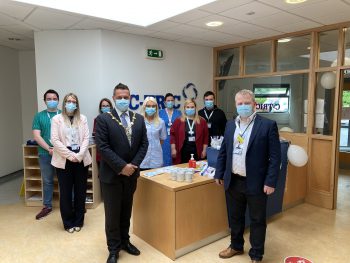
It connects patients directly to national and international research opportunities, and aims to improve patient care in the community.
It held an event on International Clinical Trials Day in May, which Caitríona Lavery, research nurse manager at C-TRIC, said had been an opportunity to celebrate the facility and the team behind it.
She added: “We work together to build a better healthcare future for all, providing improved patient care and outcomes for current and future patients.”
- £50 million data innovation hub at Ulster University to support UK manufacturers to accelerate development of digital technologies
- Dedicated grant funding will be provided to manufacturers to implement expert recommendations from data scientists
- Adoption of digital technologies such as Industrial Internet of Things and artificial intelligence is key to driving manufacturing productivity, sustainability and competitiveness
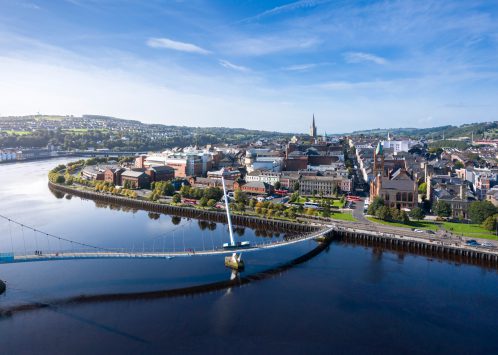
UK manufacturers are to have their productivity and competitiveness boosted thanks to a new data innovation hub and testbed led by Ulster University, Industry Minister Lee Rowley announced today (Wednesday 18 May).
The £50 million Smart Manufacturing Data Hub (SMDH) will support small and medium size manufacturers to capture and better utilise their data, helping them increase productivity, growth and sustainability. Businesses in sectors spanning from food and drink, aerospace and many more will be supported to develop, test and adopt the latest data-driven technologies.
Nearly 10,000 manufacturers are expected to benefit from the hub and 13,000 jobs will be supported, helping to boost economic growth and level-up regions across the UK. The hub will be supported by £20 million from the UK government backed Made Smarter Innovation Programme, along with £30 million of business co-investment.
UK Industry Minister Lee Rowley said:
“As we embrace the digital manufacturing revolution, it is vital manufacturers across the UK can capitalise on the productivity and growth gains that come with the adopting the latest data-led digital technologies.
“The Smart Manufacturing Data Hub, backed by £20 million of government funds, will support companies to implement cutting edge production and process techniques themselves, helping bring the next generation of products to our shelves in a more efficient and sustainable way.”
The hub will host an online Manufacturing Data Exchange Platform that will enable companies to submit their manufacturing data and receive recommendations in return, helping to improve their products and processes. A dedicated £5 million fund will then provide companies with grants to make further improvements in areas of critical importance to their business.
Virtual manufacturing testbeds will allow companies to create a “digital twin” to simulate the implementation of digital technology on their own processes, harnessing data from other manufacturers that have already adopted the technologies to encourage investment.
The SMDH will also provide manufacturers with expert analysis of their emissions and energy data from support staff specialising in data analytics and engineering, which will help them target reductions in waste, energy use and ultimately improve sustainability.
Pro Vice Chancellor Research at Ulster University Professor Liam Maguire said:
“Made Smarter provides the opportunity for innovative collaboration that will be transformative in driving industry competitiveness. At Ulster University, we have a strong track record of collaboration; using our research and technology to act as a catalyst for change, innovation and positive economic, social and environmental impact. Made Smarter is another important project in the broader realisation of the Derry and Strabane City Deal agenda, further enhancing the attractiveness of investment and driving economic growth”
The SMDH will first be accessible by small and medium size manufacturers in Northern Ireland in the coming months, before going live for companies across the rest of the UK. The programme will be supported across the rest of the UK by 12 delivery partners, including the University of Cambridge Institute for Manufacturing, Industry Wales and Scottish Engineering.
The funding comes as part of the £300 million Made Smarter Innovation Challenge, a collaboration between UK Government and industry designed to support the development and increased use of new and existing industrial digital technologies, including artificial intelligence and virtual reality.
The challenge aims to deliver a resilient, flexible, more productive and environmentally sustainable UK manufacturing sector. It will also develop new technologies that can be exploited commercially across the manufacturing industry, worldwide.
Today’s announcement builds on the government’s Help to Grow schemes, which are helping smaller businesses to boost their productivity with training and software that is proven to get results.

